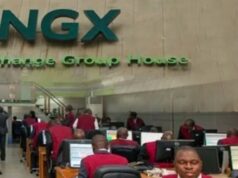The creation of a two-tier foreign exchange market is one of the options being considered by the Central bank of Nigeria (CBN) to help stem a growing economic and currency crisis.
Nigeria’s Monetary Policy Committee headed by CBN Governor Godwin Emefiele announced three weeks ago that it was fine-tuning the framework for foreign exchange management, “with a view to ensuring a more effective and liquid foreign exchange market, taking into account Nigeria’s strategic development priorities.”
Sources say the thinking behind the CBN’s proposal was to maintain the governments pro-poor policy stance of inclusive growth and welfare whereby FX will be allocated in the first market at N197/$ to priority areas such as fuel imports and local manufacturers, to kip a lid on inflation and boost domestic output.
The second naira-dollar FX market would then have a more flexible exchange rate where foreign investors, institutional players, importers and other participants such as travelers and students can buy and sell FX more freely at a market determined rate.
“The thinking is to get to a middle ground between the proponents of maintaining the status quo and those that want more flexibility in trading of the dollar-naira,” the source said on condition of anonymity since he was not authorised to speak publicly.
The CBN which gets 95 percent of its dollar reserves from oil sales has pegged the naira at N197-N199 per dollar since March, 2015 to stem its slide amid a selloff in oil prices.
The banks’ monthly FX receipts from oil taxes and royalties dropped 59.3 percent from a peak of about $3.2 billion in 2013 to $1.3 billion as at March 2015, data from the CBN show.
The naira hit a record low of N340 to the dollar on the parallel market on Friday, as importers desperate to meet their obligations scrambled for dollars.
“The problem is that the parallel market, a largely retail, cash-based market, with small transaction sizes, and a large number of small sellers of FX, remains unsuited to meet wholesale FX demand in Africa’s largest economy,” Razia Khan, Standard Chartered Plc’s chief Africa economist, said in a Feb. 8 report.
“With no other onshore FX market influenced purely by the forces of demand and supply, for now, the parallel market provides the only alternative to the official interbank market.”
The CBN foreign exchange reserves have dropped 33 percent to $27.8 billion between January 2014 and 2016 as official monthly inflows fell to less than a billion dollars last month.
The price of Brent crude, a global benchmark, has fallen from more than $100 a barrel in mid-2014 to a 13-year low of $27.10 a barrel last month.
Nigeria’s FX trading turnover was about $300-$500mn a day when the foreign exchange trading position was 1 percent of shareholders’ funds.
When the FX net open position of Nigerian banks was at 20 percent of shareholders’ funds in 2008, daily FX turnover in Nigeria was close to $1bn.
Today about $10 million is sold daily in the official market, aside from the central bank sales.
By comparison, South Africa’s spot FX market trades between $2bn and $4bn a day.
“I really do not see the big fix from the supposed two tier FX market,” said Abiodun Keripe, head of Research and Strategy at Elixir Investment Partners Limited in response to questions.
“For some positives, it may allow the CBN more ability to monitor the interplay and happenings in the second market. In addition, it may also open up inflows. However, I doubt there will be sufficient liquidity. Hence, there may be need for a major supplier (such as the CBN) to intervene in this segment. I do not see significant inflows from foreign investors.”
Nigerian corporates are increasingly finding it difficult to service offshore obligations as the dollar scarcity bites. Vincent Nwanne, of the Lagos Chamber of Commerce says 80,000 manufacturing jobs are at risk as a result of the dollar shortage and CBN FX policies.
The CBN policies have brought uncertainty. Our members cannot source dollars from the CBN even for approved manufacturers,” Nwanne said at a conference in Lagos on Thursday.
Fifty percent of the CBN’s FX sales to commercial banks are used to fund fuel imports, according to data from Standard Chartered.
Between June and December 2015, the CBN sold FX of $285 million for school fees, $2.21 billion for raw materials and $6.98 billion for foreign investors and repatriation of investments.
A two tier FX is not new to Nigeria as it was tried under the regime of former military Dictator Sanni Abacha.
The biggest drawback for the proposed system would be the potential for abuse and corruption as was the case under Abacha.
“The CBN will require strong monitoring mechanism to ensure that buyers from the first market (where FX is sold to priority areas at official rates) do not cross into the more market-determined second-tier market,” Keripe of Elixirs Investment Partners said.









